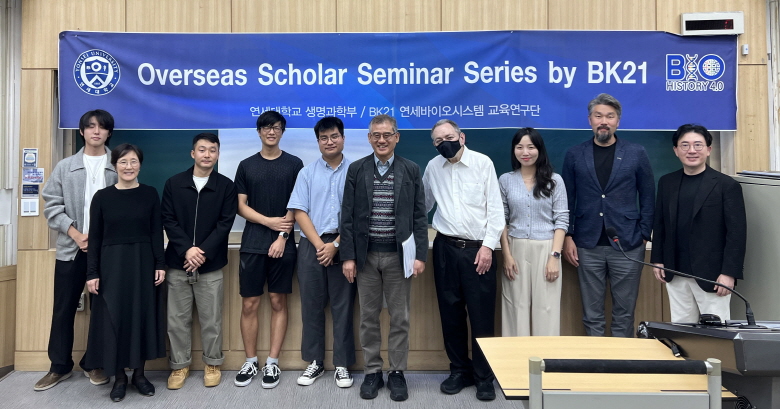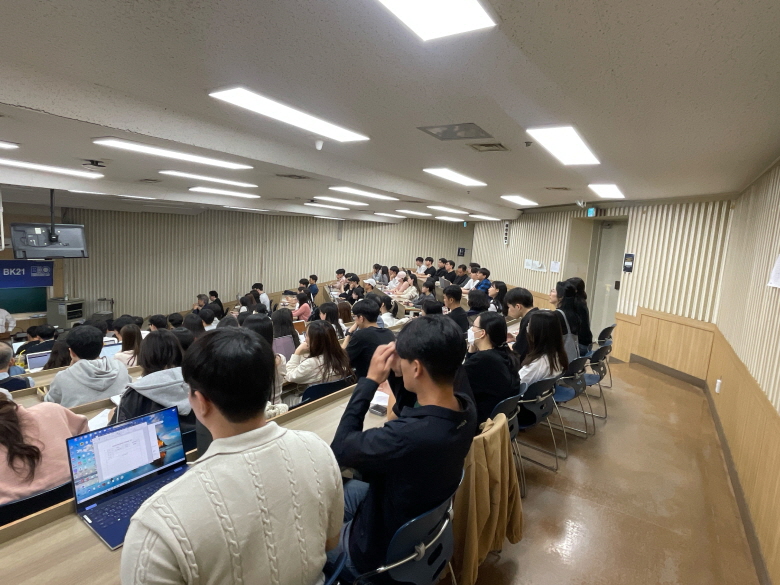- 제목
- 앤드류 파이어 노벨생리의학상 수상자 초청 세미나
- 작성일
- 2024.10.11
- 작성자
- 생명시스템대학
- 게시글 내용
-
BK21 연세바이오시스템 교육연구단은 지난 10월 10일 오후 4시 과학관 B131호에서 노벨생리의학상 수상자인 앤드류 파이어(Andrew Z. Fire) 교수를 초청해 특별 세미나를 개최했다.

[앤드류 파이어 교수 (오른쪽에서 네 번째)]
파이어 교수는 RNA 간섭(RNAi)의 창시자로 2006년 노벨생리의학상을 수상한 저명한 과학자이다. 이번 세미나에서는 “Enduring responses to change in biological systems (생물학적 시스템의 변화에 대한 지속적인 반응)”이라는 주제로 강연을 진행하며, 생명체가 다양한 자극과 변화에 어떻게 적응하는지에 대한 심도 있는 내용을 설명했다.
특히, 파이어 교수는 RNA 세계(RNA World) 가설을 중심으로 자신의 연구를 풀어나갔다. RNA 세계가설은 생명의 기원이 DNA나 단백질이 아닌 RNA이었을 가능성을 제기하며, RNA가 유전자 물질로서 뿐만 아니라 촉매 역할도 했을 것이라는 내용이다. 그는 이 가설을 뒷받침하는 역사적인 실험 결과들과 함께, RNA가 초기 생명체의 진화에서 중요한 역할을 했다는 점을 설명하며 RNA의 이중적 기능에 대해 강조했다. 또한 아직 발표되지 않은 최신 연구 결과들도 일부 공유하며 흥미를 더했다.

이번 세미나에는 학부생, 대학원생, 교수 등 150여 명이 참석하여 뜨거운 관심을 보였다. 강연 후에는 참석자들이 생명과학의 미래와 RNA의 역할에 대해 파이어 교수와 함께 자유롭게 의견을 나누는 시간을 가졌으며, 이는 학문적 교류와 소통을 촉진하는 뜻깊은 기회가 되었다.
[강연 초록]
Enduring Responses to Change in Biological Systems
Andrew Z. Fire, Ph.D.
2006 Nobel Prize in Physiology or Medicine
George D. Smith Professor of Molecular and Genetic Medicine
Professor of Pathology and of Genetics
Stanford University, USA
The genetic landscape faced by a living cell is constantly changing. Developmental transitions, environmental shifts, and pathogenic invasions lend a dynamic character to both the genome and its activity pattern. We study a variety of natural mechanisms that are utilized by cells adapting to genetic change. These include mechanisms activated during normal development and systems for detecting and responding to foreign or unwanted genetic activity. At the root of these studies are questions of how a cell can distinguish "self" versus "nonself" and "wanted" versus "unwanted" gene expression.
We primarily make use of the nematode C. elegans in our experimental studies. C. elegans is small, easily cultured, and can readily be made to accept foreign DNA or RNA. The results of such experiments have outlined a number of concerted responses that recognize (and in most cases work to silence) the foreign nucleic acid. One such mechanism ("RNAi") responds to double stranded character in RNA: either as introduced experimentally into the organism or as produced from foreign DNA that has not undergone selection to avoid a dsRNA response. Much of the current effort in the lab is directed toward a molecular understanding of the RNAi machinery and its roles in the cell. RNAi is not the only cellular defense against unwanted nucleic acid, and substantial current effort in the lab is also directed at identification of other triggers and mechanisms used in recognition and response to foreign information.
- 다음글
- 다음글이 없습니다.
